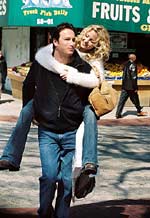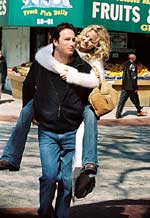 |
As far as heartwarming comedies go, this one has all the parts necessary: the heart, the warmth, and the comedy. At the outset, the storytellers get the heart commiserating with three grieving children—Audrey (Hayden Panettiere), Henry (Spencer Breslin), and Sarah (Abigail Breslin)—when their parents are killed in a car accident. The heart warms as the kids’ supercool young aunt gives up her exciting career, and the perks that come with it, to take on the uncool role of the orphaned kids’ guardian. The chuckles come easily, even in the predictable moments, as you watch dazzling Helen Harris (Kate Hudson) grow into her new skin.
Helen’s choice to take the journey from self-centeredness to selflessness is what distinguishes this film’s heroine from those in director Gary Marshall’s other romantic comedies, Pretty Woman and The Princess Diaries, where the focus is on the leading lady’s needs and wants.

Two God-sent cheerleaders come to Helen’s aid as she undergoes her drastic makeover. Those raising Helen are her oldest sister and supermom Jenny (Joan Cusack), who has no problem raising anyone, even her unborn child, and a hunky Lutheran pastor played by John Corbett in the same way he played the hunky fiancé in My Big Fat Greek Wedding.
Although predictable in places, the romantic dramedy represents Hollywood’s refreshingly realistic correction of the 20th century feminism: It is possible for unexpected, ill-timed motherhood, with all its emotional and financial hassles, to gratify a woman in a way unsurpassed even by a successful career in the fashion industry, a Manhattan zip code, and lenient sex life. Helen soon learns—as all people raising children do—that she can’t have it all. Manhattan gives way to Queens; sleeping with men to sleeping with three children (sometimes literally, in the same bed); nightclub hopping to teaching Sarah how to tie her shoes and shooing teenage boys away from Audrey. The party girl persona must decrease, the Mom persona must increase—and that not without growing pains.
Soon after she gets custody of the children, Helen scrambles to remain the go-getter at her job as assistant to Dominique (Helen Mirren), a high-maintenance head of a modeling agency. Sure enough, she fails. Often delayed or otherwise distracted by her nieces and nephew, she cannot fulfill the caprices of Dominique, in whose brief appearances Mirren is an evil delight. “Fashion and family don’t mix,” the fashion maven dryly declares. So the kids win. Helen flashes her easy, winsome smile, and gets a much less demanding, but also much less paying, job at a car dealership.
But not all mothering decisions are so easy for Helen. When it comes to disciplining teenager Audrey, Helen just can’t bring herself to act or look like a party-pooping parent. That’s when she calls her oldest sister Jenny, an obsessively in-charge stay-at-home mother, in which role Cusack showcases her comedic flair. Jenny is openly perplexed, and secretly jealous, at the deceased sister’s designation of Helen—the freewheeling anti-Mom who doesn’t tell on teenage Audrey after she gets a fake ID—instead of her, as the children’s caretaker.
As sisterly rivalry surfaces in the sometimes-charged interactions between Helen and Jenny, the movie gains a convincing emotional texture. But when the mystery of their sister’s choice is revealed in letters she had written to the sisters, Jenny, too, will grow as a result.

Pastor Dan seems to be another God-sent helper for Helen in an answer to a prayer she sighs as she’s driving in Queens in search for a decent school. But no, scratch it. God would have sent her a pastor who’s a little less desperate to prove that not all pastors are pontificators with stained-window voices. Played insipidly by Corbett, the minister is principal of the private school that ends up enrolling the children. Unlike the actor—who told Christianity Today Movies that he’s a born-again Christian—Pastor Dan is not forthcoming about his faith. Just the opposite.
The director and script writers (Patrick Clifton, Beth Rigazio, Jack Amiel, and Michael Begler) have done ministers everywhere a favor by daring to portray a pastor as a potential object of female desire, and not the butt of jokes.
“I’m a sexy man of God, and I know it,” announces Pastor Dan at one cute point, and the moment is instantly ripe for a passionate kiss. It’s only too bad that the script is so intent on making the man of God so with-it that whatever it is that drove him to become a pastor in the first place gets crowded out by his played-up hunkiness and hipness. He even watches—or just jokes about watching—dirty movies, and then tries to use this asset in trying to get Helen to go out with him. True, he is there for her in times of trouble, as is the pastoral thing to do. But the man’s soul is nowhere to be found. We never really glimpse the Spirit—any spirit, really—inside this minister. Nor do we learn if there’s anything besides Helen’s looks that attracts him to the woman who is not a churchgoer.
But when the two evoke laughs, you forgive such character-development omissions. When Helen lies to Pastor Dan that she and the children are Lutherans, thinking that it’s a requirement for the students at the Lutheran school, he deadpans. “We’ll have to take a blood test to make sure.” “All three of them are hemophiliacs,” she’s quick to fib.
In this scene, and in others, she’ll do anything for the kids. When a woman’s right to choose is guided by her concern for the well being of a child—however inconvenient the consequences—it yields freedom and peace of conscience. This is Helen’s lib. A call for altruism conveyed not in a truism, but in a heartwarming comedy—now, that’s Hollywood at its stealthiest.
Talk About It
Discussion starters- Helen gave up her career ambitions in order to become a guardian of three children. What biblical examples of people giving up their dreams or making sacrifices for the sake of others inspire you? Why? (Examples: Mary, Jacob, Hosea.)
- Has a needy person—a child, an ill or bedridden person, or an elderly relative—ever depended on you? What sacrifices did you make in order to be there for them?
- How does it feel to deny your own wants or dreams in order to put others first? Does such altruism always come with rewards?
- What’s the popular culture’s message to young women and men just starting promising careers? Do they tend to see the unexpected appearance of children in their lives—via pregnancy, custody, or some other way—as a blessing or an inconvenience?
- How would you react if someone gave you custody of their children?
The Family Corner
For parents to considerThis fairly clean movie has just a few lines that are below par. At one point, we see teenagers smoking at a party. In another scene, it’s implied that two of them are about to have sex; they are broken up by the supermom, though. The parents’ death in a car crash is not shown.
Photos © Copyright Touchstone Pictures
What Other Critics Are Saying
compiled by Jeffrey Overstreetfrom Film Forum, 06/03/04In Raising Helen, a career girl played by Kate Hudson (Almost Famous) suddenly finds herself responsible for her sister’s three children. The responsibilities and challenges cause a serious disturbance in her professional life, but they also open a romantic opportunity with a Lutheran minister (John Corbett of My Big Fat Greek Wedding).
Religious press critics are divided as to whether the film treats religion in an admirable manner. They’re also split over whether the movie is any good.
Agnieszka Tennant (Christianity Today Movies) writes, “Although predictable in places, the romantic dramedy represents Hollywood’s refreshingly realistic correction of the 20th century feminism: It is possible for unexpected, ill-timed motherhood, with all its emotional and financial hassles, to gratify a woman in a way unsurpassed even by a successful career in the fashion industry, a Manhattan zip code, and lenient sex life.”
Michael Elliott (Movie Parables) says, “What humor exists in this film plays flat and the drama is of the maudlin variety. The tone is off, the pacing is slow, and the characters are uninteresting. Kate Hudson is certainly cute enough but isn’t able to establish a sympathetic connection with the audience. The wonderful Joan Cusack gamely gives her best effort in playing a one dimensional character and John Corbett has trouble reaching even that one dimension.”
Chris Monroe (Christian Spotlight) says, “This film is very playful, yet coherent, and tells a sweet kind of uplifting story. It upholds good morals and even carries with it some touching moments. Seeing this movie is an easy-going way to raise your spirits.”
Rhonda Handlon (Plugged In) points out some “imperfections,” and then concludes, “This is an enduring story of lives changed by selfless choices and the intangible return of investing in others. It’s also the story of one cool mom!”
Gene Edward Veith (Plugged In) says, “The best part of the movie is how it portrays a pastor. Pastor Dan is strong and wise, ministering both to Helen, the rookie mom, and to the still-grieving children, including rescuing the teenage girl from some bad company. This so-called ‘sexy man of God’ is in refreshing contrast to Hollywood’s usual portrayal of ministers, who are usually presented as either evil hypocrites or ineffectual wimps. Pastor Dan is clearly a man of faith, though not a lot of the content of that faith is articulated in the movie. Critics are saying that the movie is cloying and has various other faults. Though they may have a point, the movie is enjoyable and positive (though not for children), representing a post-Passion Hollywood.”
Annabelle Robertson (Crosswalk) has a very different opinion of Pastor Dan. She’s troubled by the idea that a good pastor would date an unbeliever. She also criticizes the portrayal of a Lutheran pastor who claims to believe in purgatory.
Finally, Robertson observes, “On the surface, the message of Raising Helen is that mothering is more important than anything else we could pursue in life, including career. Dig a little deeper, however, and a second message about motherhood emerges—one that contradicts the first. Ultimately, according to the film, the best mom is the one who can somehow manage career and home. The film clearly implies that single mothers are far better than couples (even happily married, loving, experienced parents).”
Mainstream critics are less than enthusiastic about the film.
Copyright © 2004 Christianity Today. Click for reprint information.










